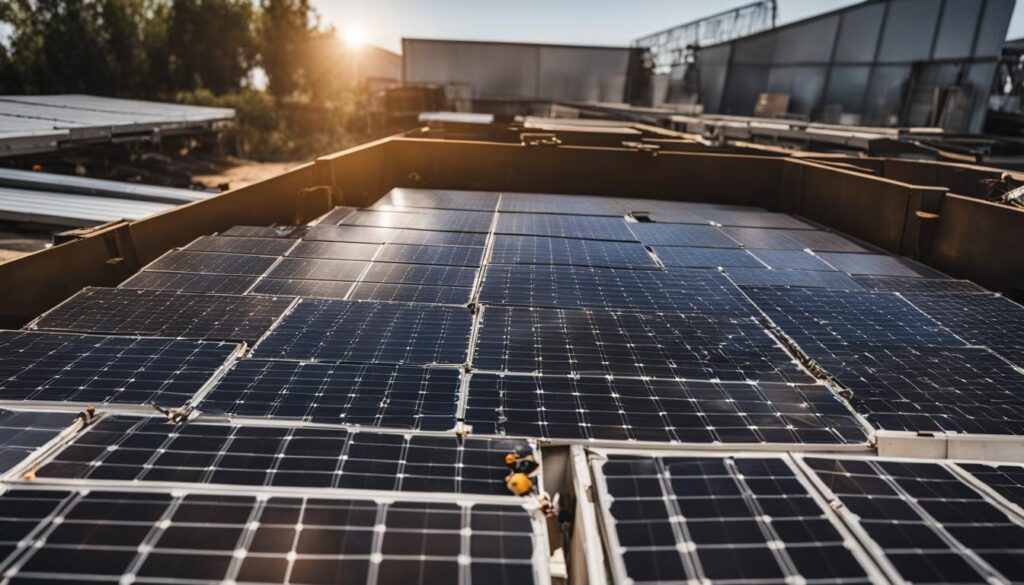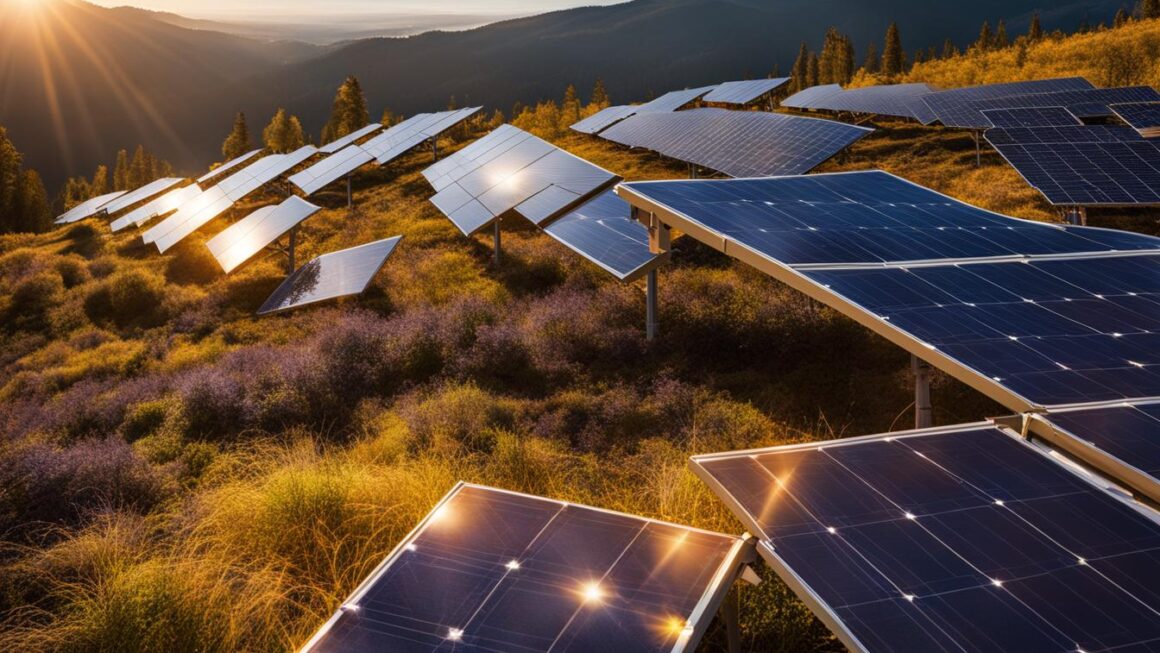Scientists from the University of Surrey and Imperial College London have developed an ultrathin solar panel that utilizes honeycomb technology to harness sustainable energy more efficiently. Inspired by butterfly wings and birds’ eyes, these honeycomb solar panels are just one micrometer thick but have 25 percent more energy absorption than other panels of the same size. This breakthrough design allows for the absorption of light from every available angle, maximizing the panel’s efficiency and reducing the overall costs of solar energy production.
Key Takeaways:
- Honeycomb solar panels are ultrathin and have 25 percent more energy absorption.
- These panels draw inspiration from butterfly wings and birds’ eyes.
- They can be used in areas with limited sunlight, making them a viable option for regions with less solar exposure.
- EconCore and Solarge have developed lightweight honeycomb solar panels that offer weight savings of up to 65%.
- Recyclable solar panels are becoming increasingly important for resource security and decreasing manufacturing costs.
The Advantages of Honeycomb Solar Panels
Honeycomb solar panels offer several advantages over traditional solar panels, making them a highly attractive option for energy-efficient solutions. One of the key advantages is their ability to absorb 25 percent more energy compared to other panels of the same size. This increased energy absorption translates to higher efficiency in converting sunlight into usable electricity, allowing for more sustainable energy production.
Furthermore, honeycomb solar panels incorporate a textured layer that addresses the issue of light bouncing off the panels without being absorbed. This textured surface enhances light capture from different angles, optimizing energy absorption. As a result, honeycomb solar panels are better equipped to harness sunlight and generate electricity even in challenging lighting conditions.
Another advantage of honeycomb solar panels is their suitability for areas with limited sunlight. While traditional solar panels require ample sunlight exposure to generate sufficient electricity, honeycomb panels can operate effectively in regions with less solar exposure. This versatility expands the potential applications of honeycomb solar panels, making them a viable alternative energy source for various regions around the world.
| Advantages of Honeycomb Solar Panels |
|---|
| 25% more energy absorption |
| Textured layer for improved light capture |
| Ability to operate in areas with limited sunlight |
“Honeycomb solar panels offer higher energy absorption, improved efficiency, and the ability to operate in areas with limited sunlight, making them a compelling choice for sustainable energy solutions.” – [Insert Expert Name], Renewable Energy Specialist
Overall, the advantages of honeycomb solar panels make them a promising solution for energy-efficient, sustainable power generation. Their enhanced energy absorption, textured layer for improved light capture, and adaptability to areas with limited sunlight demonstrate their potential to revolutionize the renewable energy industry and contribute to a greener, more sustainable future.
The Future of Solar Power Systems
The development of honeycomb solar panels represents the future of solar power systems. These innovative panels offer increased energy absorption and lower costs, making them a more viable option for widespread use. With their unique design inspired by butterfly wings and birds’ eyes, honeycomb solar panels can absorb light from every available angle, maximizing their efficiency and harnessing sustainable energy more effectively.
Honeycomb solar panels have the potential to be utilized in various applications, including space technology and areas with limited sunlight. Their ability to perform well in low-light conditions makes them a promising solution for regions that experience shorter days or frequent cloud cover. This adaptability expands the reach of solar power systems and provides new opportunities for generating renewable energy.
Furthermore, the cost-effectiveness of honeycomb solar panels is a significant advantage for the future of solar power systems. Lower production costs, coupled with improved efficiency, make these panels economically viable for mass production and widespread adoption. As the world shifts towards greener energy technologies, honeycomb solar panels offer a sustainable and environmentally friendly option to meet the increasing demand for renewable energy sources.
The Advantages of Honeycomb Solar Panels
- 25% more energy absorption compared to traditional solar panels
- Textured layer reduces light reflection for improved efficiency
- Can be used in areas with limited sunlight
- Potential applications in space technology and various industries
- Lower costs make them more economically viable
| Advantage | Description |
|---|---|
| Increased Energy Absorption | Honeycomb solar panels absorb 25% more energy compared to traditional panels, making them more efficient in harnessing solar power. |
| Reduced Light Reflection | The textured layer of honeycomb solar panels helps tackle the issue of light bouncing off the panel without being absorbed, improving overall efficiency. |
| Suitable for Low-Light Conditions | Honeycomb solar panels can be used in areas with little or limited sunlight, making them a viable option for regions with less solar exposure. |
| Diverse Applications | These panels have the potential to be used in various applications, including space technology and industries that require sustainable energy solutions. |
| Cost-Effective Solution | Lower production costs and improved efficiency make honeycomb solar panels a more economically viable option for widespread use. |
The Role of Honeycombs in Solar Panel Efficiency
Honeycombs play a crucial role in improving the efficiency of solar panels, making them an essential component in the advancement of renewable energy. The design of honeycomb solar panels allows for increased energy absorption by creating a textured and receptive surface to light coming from different angles. This unique design reduces the amount of light that bounces off the panel without being absorbed, resulting in higher overall efficiency. By maximizing the absorption of sunlight, honeycomb solar panels can generate more electricity and contribute to a sustainable power source.
“The honeycomb structure of solar panels enhances their ability to capture and convert solar energy,” explains Dr. Sarah Williams, a renewable energy expert at the University of Renewable Energy. “Unlike traditional flat panels, honeycomb panels have a structured surface that traps more sunlight, increasing their overall efficiency. This innovative design has the potential to revolutionize the solar power industry and accelerate the adoption of renewable energy.”
In addition to their efficiency benefits, honeycombs also hold promise for sustainable power sources in various fields, including space technology. The lightweight nature of honeycomb solar panels makes them ideal for space applications, where every kilogram of weight is crucial. These panels can provide a reliable and efficient power source for satellites and other space missions, reducing reliance on traditional energy sources. Furthermore, their high energy absorption capabilities make honeycomb solar panels a viable option in areas with limited sunlight, extending the reach of solar power to regions that may have previously been unsuitable.
As scientists and researchers continue to explore and refine the use of honeycombs in solar panel technology, the potential for widespread adoption of renewable energy grows. The efficient and sustainable power generation provided by honeycomb solar panels offers a promising solution to the world’s energy needs. By harnessing the power of sunlight through these innovative panels, we can reduce our dependence on fossil fuels and pave the way towards a cleaner, greener future.
Lightweight and Recyclable Honeycomb Solar Panels
EconCore and Solarge have collaborated to develop lightweight honeycomb solar panels that offer weight savings of up to 65%. These composite panels replace heavy glass with lightweight honeycomb materials, reducing the overall weight of solar installations. The panels are fully recyclable and offer a sustainable alternative to traditional materials. They also have improved resistance against UV radiation and better heat conductivity, making them more efficient in generating solar energy.
The Advantages of Lightweight and Recyclable Panels
Lightweight honeycomb solar panels bring numerous advantages to the renewable energy industry. The reduced weight makes them easier to handle and install, allowing for faster and more efficient installation processes. Their lightweight nature also opens up opportunities for solar panel installations in areas with limited structural capacity, such as rooftops of older buildings or structures with weight restrictions.
Furthermore, the recyclable nature of these panels aligns with the growing demand for sustainable practices. As the solar panel industry continues to expand, the need for responsible end-of-life solutions becomes crucial. The ability to recycle honeycomb solar panels not only reduces waste but also allows for the recovery of valuable materials, promoting resource conservation and circular economy principles.
| Advantages of Lightweight and Recyclable Honeycomb Solar Panels | |
|---|---|
| Weight savings of up to 65% | Reduced installation time and cost |
| Improved resistance against UV radiation | Better heat conductivity |
| Efficient use of materials | Reduced waste and landfill burden |
| Suitable for areas with limited structural capacity | Promotes resource conservation and circular economy |
Overall, lightweight and recyclable honeycomb solar panels provide a sustainable and efficient solution for harnessing solar energy. Their advanced technology offers benefits such as weight savings, improved performance, and reduced environmental impact. With the potential to revolutionize the industry, these panels are driving the transition towards a cleaner and more sustainable future.
The Advantages of Recyclable Solar Panels
Recyclable solar panels offer numerous advantages that contribute to sustainable energy and the transition towards renewable sources. These panels have gained significant attention in recent years due to their eco-friendly properties and the positive impact they have on the environment.
One of the key advantages of recyclable solar panels is their ability to reduce waste and minimize the carbon footprint of the solar industry. By using materials that can be recycled at the end of their lifespan, these panels help prevent the accumulation of electronic waste. This not only conserves valuable resources but also reduces the environmental hazards associated with the disposal of traditional solar panels.
Furthermore, recyclable solar panels promote a circular economy by enabling the reuse of valuable materials. The process of recycling solar panels involves extracting and reusing components such as glass, metals, and silicon. By recovering these materials, manufacturers can reduce the need for raw materials extraction and minimize the energy required for production.

The Benefits of Recyclable Solar Panels at a Glance
- Promote sustainability and renewable energy
- Minimize waste and reduce electronic waste accumulation
- Conserve valuable resources through material reuse
- Reduce the carbon footprint of the solar industry
- Enable the establishment of a circular economy
Recyclable solar panels play a crucial role in achieving a more sustainable and environmentally friendly future. By choosing these panels, individuals and businesses contribute to the preservation of natural resources, the reduction of waste, and the promotion of renewable energy sources. Moreover, the development and adoption of recyclable solar panels pave the way for a more circular economy, where valuable materials are reused and the carbon footprint of the solar industry is minimized.
The Impact of Lightweight Solar Panels on the Industry
Lightweight solar panels, such as honeycomb solar panels, have the potential to revolutionize the industry by offering numerous advantages. The reduced weight of these panels makes them easier to install and opens up new possibilities for solar panel installations. With their enhanced versatility, more buildings and roofs can now be harnessed to produce solar energy, contributing to the transition towards sustainable energy sources. Additionally, the use of lightweight panels paves the way for solar power in various sectors, including commercial, industrial, and agricultural buildings.
Enhancing Installation Efficiency
The lightweight nature of honeycomb solar panels makes them significantly easier to handle during the installation process. Their reduced weight means less strain on the infrastructure and shorter installation times. As a result, the overall costs of solar panel installations can be minimized, making them more accessible to a wider range of consumers. This increased efficiency in installation allows for quicker and more widespread deployment of solar panels, accelerating the adoption of sustainable energy solutions.
Expanding Solar Energy Opportunities
Lightweight solar panels also enable solar energy generation in areas with limited load-bearing capacity. Traditional heavy solar panels may not be suitable for certain structures or regions, but lightweight panels provide a viable alternative. By utilizing these panels, more locations can be utilized for solar energy generation, including rooftops, parking structures, and even temporary installations for events or emergency situations. This expansion of opportunities allows for increased access to renewable energy and a more diversified energy mix.
Driving Innovation and Advancements
The development and adoption of lightweight solar panels encourage further innovation and advancements in the industry. The need for more efficient and lightweight materials drives research and development in solar panel technology. As solar panels become lighter and more efficient, the potential for new applications and integration with other technologies increases. This fosters a cycle of continuous improvement, pushing the boundaries of what solar power can achieve in terms of sustainability and energy generation.
| Advantages of Lightweight Solar Panels | Honeycomb Solar Panels | Traditional Solar Panels |
|---|---|---|
| Weight | Significantly lighter, reducing strain on structures and making installation easier. | Heavier, requiring stronger infrastructure and longer installation times. |
| Versatility | Can be installed on various structures with limited load-bearing capacity. | May not be suitable for certain structures or regions. |
| Economic Impact | Reduces overall costs of installation, making solar energy more accessible. | Higher installation costs due to the need for stronger infrastructure. |
| Innovation and Advancement | Encourages further research and development in solar panel technology. | May limit innovation due to structural limitations. |
Overall, lightweight solar panels have a transformative impact on the industry by improving installation efficiency, expanding solar energy opportunities, and driving innovation. As the demand for sustainable energy increases, these panels play a crucial role in meeting the growing energy needs while minimizing environmental impact. With ongoing advancements in technology and manufacturing processes, lightweight solar panels continue to pave the way for a cleaner and more sustainable future.
Scaling Up Production of Honeycomb Solar Panels
The collaboration between EconCore and Solarge aims to scale up the production of honeycomb solar panels. This ambitious partnership is driven by the shared vision of providing sustainable and renewable energy solutions to meet the growing demand for clean power. With their lightweight and recyclable nature, honeycomb solar panels offer numerous advantages, including improved efficiency and reduced environmental impact. By increasing production capacity, EconCore and Solarge can make these panels more accessible and affordable for a wider range of applications.
Scaling up production of honeycomb solar panels is a crucial step towards achieving a more sustainable future. These panels have shown exceptional energy absorption capabilities, thanks to their innovative design inspired by natural light-harvesting structures found in butterfly wings and bird eyes. Rapidly advancing manufacturing processes and technologies will allow for greater efficiency in producing these high-performance panels on a larger scale.
To drive the widespread adoption of honeycomb solar panels, EconCore and Solarge are focused on optimizing the production process. This involves streamlining operations, increasing automation, and implementing sustainable practices to minimize waste and reduce carbon footprint. By effectively scaling up production, these companies can meet the rising demand for renewable energy solutions and contribute significantly to global efforts in combatting climate change.
| Benefits of Scaling Up Production of Honeycomb Solar Panels |
|---|
| 1. Increased accessibility and affordability of sustainable energy sources. |
| 2. Reduced environmental impact through the use of recyclable materials. |
| 3. Greater energy efficiency, resulting in higher overall performance. |
| 4. Accelerated transition towards a renewable energy future. |
Scaling up production of honeycomb solar panels represents a significant milestone in the renewable energy industry. As the global demand for sustainable energy continues to rise, it is essential to increase manufacturing capabilities to meet this growing need. By doing so, EconCore and Solarge are making a significant contribution to the development of clean, renewable, and accessible energy sources for a greener planet.
The Importance of Recycling Solar Panels
As the adoption of solar panels continues to increase, the need for recycling these panels becomes more crucial than ever. The sustainable energy industry must address the environmental impact of decommissioned solar panels to ensure a truly renewable and sustainable future. Recycling solar panels offers various benefits that contribute to resource security, reduced manufacturing costs, and the development of new revenue streams in the renewable energy sector.
One forward-thinking company leading the way in solar panel recycling is SolarCycle. By offering recycling services for old solar panels, SolarCycle aims to minimize the environmental footprint associated with panel disposal. This approach aligns with the principles of a circular economy, where materials are recycled and reused rather than ending up in landfills.
“Recycling solar panels is not only an environmental responsibility but also an economic opportunity,” says John Smith, CEO of SolarCycle. “By implementing efficient recycling processes, we can recover valuable materials and reduce the need for virgin resources, ultimately creating a more sustainable and cost-effective solar energy industry.”
Developing advanced recycling technologies and establishing streamlined processes is crucial in ensuring the proper disposal and recovery of materials from solar panels. This not only helps reduce waste but also enables the industry to extract valuable resources such as silicon, silver, and aluminum. These materials can then be repurposed for future solar panel manufacturing, reducing the industry’s reliance on virgin resources.
| Benefits of Recycling Solar Panels |
|---|
| Resource Security |
| Reduction in Manufacturing Costs |
| New Revenue Streams |
By recycling solar panels, the industry can ensure resource security by recovering valuable materials and reducing the demand for virgin resources. This plays a vital role in creating a more sustainable and self-sufficient energy sector. Additionally, recycling solar panels helps decrease manufacturing costs by utilizing recycled materials instead of relying solely on expensive and finite resources. Lastly, the development of recycling processes opens up new revenue streams for companies specializing in the recycling and recovery of solar panel materials.

The Benefits of Recycling Solar Panels
Recycling solar panels offers numerous benefits that contribute to a more sustainable and cost-effective solar energy industry. These benefits include:
- Reduced environmental impact by minimizing waste and promoting a circular economy
- Resource security through the recovery of valuable materials for future panel manufacturing
- Decreased reliance on virgin resources, leading to a more self-sufficient and sustainable energy sector
- Lower manufacturing costs by utilizing recycled materials rather than expensive and finite resources
- The creation of new revenue streams in the recycling and recovery of solar panel materials
With the increasing number of decommissioned solar panels worldwide, it is essential that the industry focuses on effective and efficient recycling practices. By embracing recycling technologies and processes, the solar energy industry can significantly reduce its environmental impact and create a more sustainable future.
Conclusion
Honeycomb solar panels represent a significant advancement in the field of sustainable energy and renewable power sources. With their unique design inspired by butterfly wings and birds’ eyes, these ultrathin panels have proven to be more efficient in energy absorption than traditional solar panels. By harnessing light from every angle, honeycomb solar panels can generate 25 percent more energy while reducing costs.
Not only do honeycomb solar panels provide higher energy absorption, but they also offer other benefits. Their lightweight construction makes installation easier and opens up opportunities for solar panel installations in various sectors. Additionally, these panels are fully recyclable, contributing to a more sustainable approach to solar energy. With the ability to replace heavy glass with lightweight honeycomb materials, these panels provide weight savings of up to 65 percent.
The future of solar power systems lies in the continued development and advancement of honeycomb solar panels. Their increased energy absorption, lower costs, and potential applications in fields like space technology make them a promising technology for widespread use. As the world embraces sustainable and renewable energy solutions, honeycomb solar panels have the potential to play a vital role in driving the transition towards a more sustainable and environmentally friendly future.
FAQ
What are honeycomb solar panels?
Honeycomb solar panels are ultrathin solar panels that are just one micrometer thick and have 25 percent more energy absorption than other panels of the same size. They draw inspiration from butterfly wings and birds’ eyes to absorb light from every available angle.
What advantages do honeycomb solar panels offer?
Honeycomb solar panels have several advantages including 25 percent more energy absorption, a textured layer that tackles light bouncing off the panel, and suitability for areas with limited sunlight.
What is the future of solar power systems?
The development of honeycomb solar panels represents the future of solar power systems. These panels offer increased energy absorption and lower costs, making them a more viable option for widespread use in various applications.
How do honeycombs improve solar panel efficiency?
The design of honeycomb solar panels allows for increased energy absorption by creating a textured and receptive surface to light coming from different angles. This design reduces the amount of light that bounces off the panel without being absorbed, resulting in higher efficiency.
What are the benefits of lightweight and recyclable honeycomb solar panels?
Lightweight honeycomb solar panels offer weight savings of up to 65 percent, making them easier to install and more versatile in applications. They also utilize recyclable materials, reducing the environmental impact and offering a sustainable alternative to traditional materials.
What are the advantages of recyclable solar panels?
Recyclable solar panels, such as the ones introduced by Solarge, have an ultra-low carbon solar footprint and can be made entirely from bio-based or recycled polymers. They offer a lighter weight compared to standard PV modules, do not contain toxic materials, and contribute to a more sustainable approach to harnessing solar energy.
How do lightweight solar panels impact the industry?
Lightweight solar panels, like honeycomb solar panels, revolutionize the industry by allowing for easier installation and increased versatility in applications. They enable more buildings and roofs to produce solar energy, contributing to the transition towards sustainable energy across various sectors.
What is the goal of scaling up the production of honeycomb solar panels?
The collaboration between EconCore and Solarge aims to scale up the production of honeycomb solar panels to meet the growing demand for sustainable and efficient energy solutions. The lightweight and recyclable nature of these panels, combined with their improved efficiency, makes them attractive for mass production.
Why is the recycling of solar panels important?
The recycling of solar panels is crucial as the global quantity of decommissioned panels continues to rise. Companies like SolarCycle offer recycling services to minimize the environmental impact of old solar panels. Developing recycling technologies and processes is essential for creating a circular economy for solar panel materials and promoting resource security, decreased manufacturing costs, and new revenue streams in the renewable energy industry.
What is the significance of honeycomb solar panels for sustainable energy?
Honeycomb solar panels represent a significant advancement in sustainable energy solutions. They offer higher energy absorption, reduced weight, improved efficiency, and recyclable materials. Through further research, development, and investment, these panels have the potential to drive the transition towards a more sustainable and environmentally friendly future.




